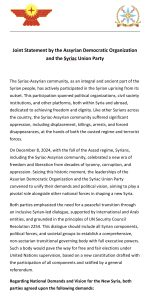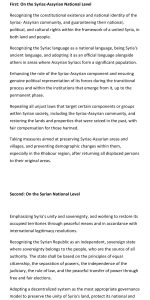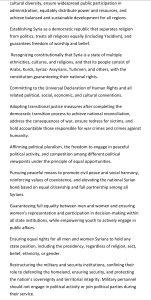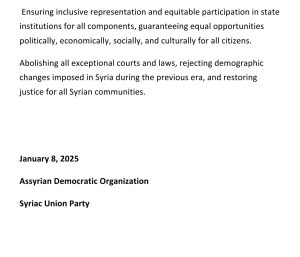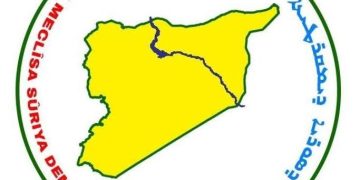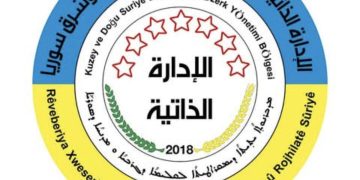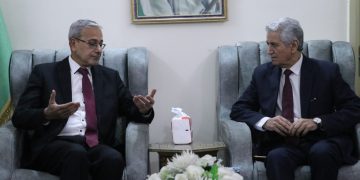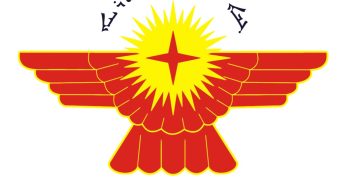The Syriac-Assyrian community, as an integral and ancient part of the Syrian people, has actively participated in the Syrian uprising from its outset. This participation spanned political organizations, civil society institutions, and other platforms, both within Syria and abroad, dedicated to achieving freedom and dignity. Like other Syrians across the country, the Syriac-Assyrian community suffered significant oppression, including displacement, killings, arrests, and forced disappearances, at the hands of both the ousted regime and terrorist forces.
On December 8, 2024, with the fall of the Assad regime, Syrians, including the Syriac-Assyrian community, celebrated a new era of freedom and liberation from decades of tyranny, corruption, and oppression. Seizing this historic moment, the leaderships of the Assyrian Democratic Organization and the Syriac Union Party convened to unify their demands and political vision, aiming to play a pivotal role alongside other national forces in shaping a new Syria.
Both parties emphasized the need for a peaceful transition through an inclusive Syrian-led dialogue, supported by international and Arab entities, and grounded in the principles of UN Security Council Resolution 2254. This dialogue should include all Syrian components, political forces, and societal groups to establish a comprehensive, non-sectarian transitional governing body with full executive powers. Such a body would pave the way for free and fair elections under United Nations supervision, based on a new constitution drafted with the participation of all components and ratified by a general referendum.
Regarding National Demands and Vision for the New Syria, both parties agreed upon the following demands:
First: On the Syriac-Assyrian National Level
Recognizing the constitutional existence and national identity of the Syriac- Assyrian community, and guaranteeing their national, political, and cultural rights within the framework of a united Syria, in both land and people.
Recognizing the Syriac language as a national language, being Syria’s ancient language, and adopting it as an official language alongside others in areas where Assyrian Syriacs form a significant population.
Enhancing the role of the Syriac-Assyrian component and ensuring genuine political representation of its forces during the transitional process and within the institutions that emerge from it, up to the permanent phase.
Repealing all unjust laws that target certain components or groups within Syrian society, including the Syriac-Assyrian community, and restoring the lands and properties that were seized in the past, with fair compensation for those harmed.
Taking measures aimed at preserving Syriac-Assyrian areas and villages, and preventing demographic changes within them, especially in the Khabour region, after returning all displaced persons to their original areas.
Second: On the Syrian National Level
Emphasizing Syria’s unity and sovereignty, and working to restore its occupied territories through peaceful means and in accordance with international legitimacy resolutions.
Recognizing the Syrian Republic as an independent, sovereign state where sovereignty belongs to the people, who are the source of all authority. The state shall be based on the principles of equal citizenship, the separation of powers, the independence of the judiciary, the rule of law, and the peaceful transfer of power through free and fair elections.
Adopting a decentralized system as the most appropriate governance model to preserve the unity of Syria’s land, protect its national and cultural diversity, ensure widespread public participation in administration, equitably distribute power and resources, and achieve balanced and sustainable development for all regions.
Establishing Syria as a democratic republic that separates religion from politics, treats all religions equally (including Yazidism), and guarantees freedom of worship and belief.
Recognizing constitutionally that Syria is a state of multiple ethnicities, cultures, and religions, and that its people consist of Arabs, Kurds, Syriac- Assyrians, Turkmen, and others, with the constitution guaranteeing their national rights.
Committing to the Universal Declaration of Human Rights and all related political, social, economic, and cultural conventions.
Adopting transitional justice measures after completing the democratic transition process to achieve national reconciliation, address the consequences of war, ensure redress for victims, and hold accountable those responsible for war crimes and crimes against humanity.
Affirming political pluralism, the freedom to engage in peaceful political activity, and competition among different political viewpoints under the principle of equal opportunities.
Pursuing peaceful means to promote civil peace and social harmony, reinforcing values of coexistence, and elevating the national Syrian bond based on equal citizenship and full partnership among all Syrians.
Guaranteeing full equality between men and women and ensuring women’s representation and participation in decision-making within all state institutions, while empowering youth to actively engage in public affairs.
Ensuring equal rights for all men and women Syrians to hold any state position, including the presidency, regardless of religion, sect, belief, ethnicity, or gender.
Restructuring the military and security institutions, confining their role to defending the homeland, ensuring security, and protecting the nation’s sovereignty and territorial integrity. Military personnel should not engage in political activity or join political parties during their service.
Ensuring inclusive representation and equitable participation in state institutions for all components, guaranteeing equal opportunities politically, economically, socially, and culturally for all citizens.
Abolishing all exceptional courts and laws, rejecting demographic changes imposed in Syria during the previous era, and restoring justice for all Syrian communities.
January 8, 2025
Assyrian Democratic Organization
Syriac Union Party
